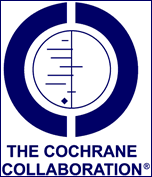|
Cochrane
Review of Pegylated Interferon plus Ribavirin for Hepatitis
C Treatment in People with HIV

| Pegylated
interferon (Pegasys or PegIntron) plus ribavirin
is an appropriate standard of care for HIV-HCV coinfected
patients, with sustained virological response rates
of 26% for hepatitis C virus (HCV) genotypes 1 or
4 and 57% for genotyes 2 or 3, according to a meta-analysis
by the Cochrane Hepato-Biliary Group published in
the September
2009 American Journal of Gastroenterology. |
|
By
Liz Highleyman
 Pegylated
interferon plus ribavirin is considered standard therapy
for hepatitis C for both HIV
negative and HIV positive individuals, but studies of coinfected
patients have produced inconsistent response rates. Pegylated
interferon plus ribavirin is considered standard therapy
for hepatitis C for both HIV
negative and HIV positive individuals, but studies of coinfected
patients have produced inconsistent response rates.
Lise
Lotte Gluud and colleagues with the Cochrane Hepato-Biliary
Group performed an analysis of trials to assess the efficacy
of this regimen in coinfected individuals. The Cochrane Collaboration
is an independent, non-profit network of experts that produces
and disseminates systematic reviews of healthcare interventions
and promotes evidence-based medicine.
Through
manual and electronic searches, the authors identified randomized
clinical trials comparing pegylated interferon plus ribavirin
versus other antiviral treatments for HIV positive patients
with chronic hepatitis C.
The
primary outcome measure was virological response at the end
of treatment (EOT) and sustained virological response (SVR)
measured 6 months after completion of therapy. The investigators
performed intention-to-treat meta-analyses using data from
all randomized patients.
Results
 |
The
researchers found 7 randomized trials that were eligible
for inclusion. |
 |
The
included patients had stable HIV disease, chronic hepatitis
C, and were treatment-naive, having not previously been
treated with interferon or ribavirin. |
 |
Mean
dosages used were 180 mcg/week for pegylated interferon
alfa-2a (Pegasys)
or 1.5 mcg/kg/week for pegylated interferon alfa-2b (PegIntron)
-- the standard of care for both HIV negative and HIV
positive patients. |
 |
The
mean dose of ribavirin was 800 mg/day, which is now considered
low (standard is 1000-12000 mg/day adjusted according
to body weight). |
 |
Treatment
duration ranged from 24 to 48 weeks (for HIV negative
people, standard duration is 24 weeks for genotypes 2
or 3 and 48 weeks for genotypes 1 or 4, but many experts
recommend 48 weeks for all HIV positive patients regardless
of genotype). |
 |
Pegylated
interferon plus ribavirin increased the proportion of
patients who achieved end-of-treatment or sustained virological
response compared with conventional interferon plus ribavirin
or pegylated interferon monotherapy. |
 |
In
subgroup analyses of trials comparing pegylated interferon
plus ribavirin versus conventional interferon plus ribavirin,
the proportion of patients achieving SVR was 26% for genotypes
1 or 4 and 57% for genotypes 2 or 3 (compared with rates
of about 70%-80% and 50%, respectively, for HIV monoinfected
people). |
 |
Several
adverse events occurred, including fatal lactic acidosis
and liver failure. |
 |
However,
there were no significant differences in mortality rates
between treatment groups. |
Based
on these findings, the study authors concluded, "Peginterferon
plus ribavirin may be considered for treatment-naive patients
with HIV and chronic hepatitis C. Adverse events should be
monitored carefully."
Cochrane
Hepato-Biliary Group, Copenhagen Trial Unit, Centre for Clinical
Intervention Research, Rigshospitalet, Copenhagen, Denmark;
Department of Internal Medicine, Gentofte University Hospital,
Hellerup, Denmark; Section of Internal and Vascular Medicine,
Department of Internal Medicine, University of Perugia, Perugia,
Italy.
10/27/09
Reference
L
Gluud, E Marchesini, and A Iorio. Lise Lotte Gluud. Peginterferon
Plus Ribavirin for Chronic Hepatitis C in Patients With Human
Immunodeficiency Virus. American Journal of Gastroenterology
104(9): 2335-2341. (Abstract).
|